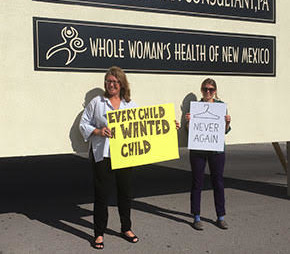Notes from the Field: Practicing Across the Border from Texas
 The Texas state legislature has passed laws that are severely restricting access to abortion in the state. A recent study estimates that between 100,000 and 240,000 women in Texas have attempted self-induced abortions as a result of these strict restrictions on abortion provision. The Reproductive Health Access Project (RHAP) medical director, Dr. Linda Prine has seen first hand the impact Texas laws have had on women. She travels to Las Cruces, New Mexico, 30 miles from the Texas border, once a month to work at Whole Women’s Health of New Mexico. There she provides abortion care to the women of New Mexico and Texas. Linda recently shared with us what her work in Las Cruces means to her.
The Texas state legislature has passed laws that are severely restricting access to abortion in the state. A recent study estimates that between 100,000 and 240,000 women in Texas have attempted self-induced abortions as a result of these strict restrictions on abortion provision. The Reproductive Health Access Project (RHAP) medical director, Dr. Linda Prine has seen first hand the impact Texas laws have had on women. She travels to Las Cruces, New Mexico, 30 miles from the Texas border, once a month to work at Whole Women’s Health of New Mexico. There she provides abortion care to the women of New Mexico and Texas. Linda recently shared with us what her work in Las Cruces means to her.
“I decided I needed the experience of working in an area where abortion access is severely restricted because I train doctors who I hope will work in low resource settings. I should know what it’s like so I can, in turn, teach others to be prepared. Working in these areas is distinctly different from working in New York City, because you’re often the only one in a low resource setting who knows how to perform an abortion.
“Besides the benefits to me as a teacher, working in Las Cruces also allows me to provide much needed reproductive health care to the women of West Texas. This part of Texas has only a handful of abortion clinics to service millions of women. Because of Texas laws, women have to make a minimum of 3 visits to get the pills for a medication abortion. The visits have to be 2 days apart, so it takes women 5 days just to get started on the medication abortion, whereas in New Mexico or New York, it takes one day. Furthermore, medication abortions in Texas are only performed up to 7 weeks. Surgical abortion is only available for women up to 20 weeks. These restrictions make it almost impossible to get an abortion in Texas. I see a full spectrum of patients from Texas coming to Las Cruces just to get an abortion. Some patients can afford to fly in from Dallas, while some have more difficult circumstances. I recently had a patient seeking an abortion who lives in her car with her daughter.
“Unlike in my practice in New York City, there are protesters out front of the clinic every day in Las Cruces. You leave the clinic and you don’t know if somebody is following you home. At RHAP, we train providers to be advocates in their community, and create support networks so these stressful experiences can be shared.”
Dr. Prine has been working on developing local support in Las Cruces. She has developed friendships with many of the people and feels at home when she visits. She stays with her friend Sharon who walks Dr. Prine around town, introducing her as “Linda, my friend who provides abortions!”
